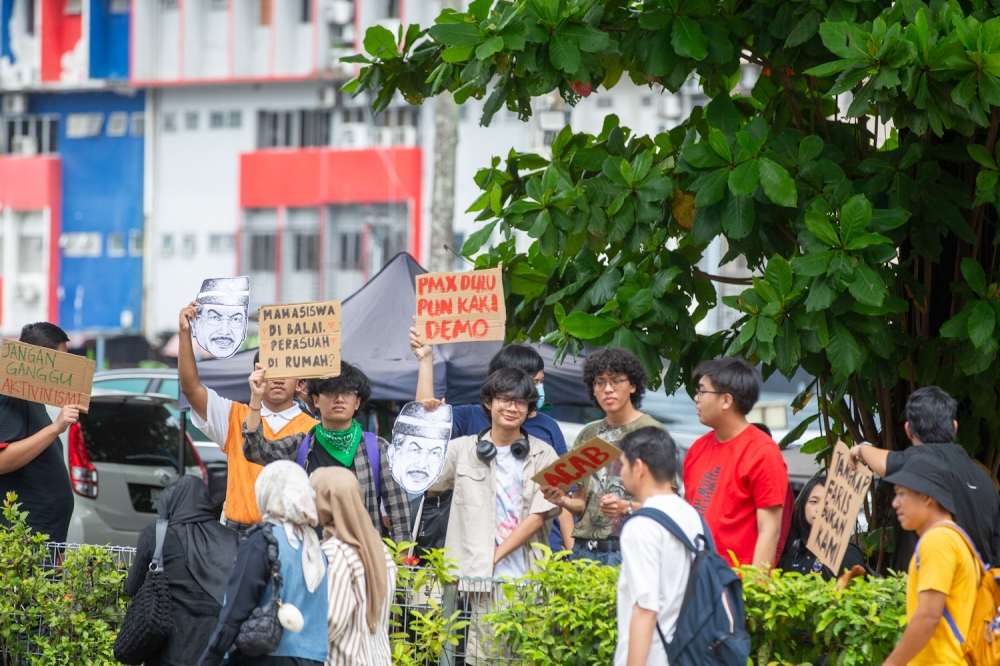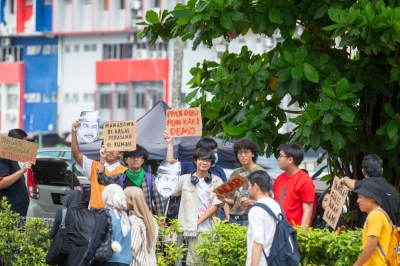February 4 — In It’s freedom under the law, not freedom from the law, I called on the organisers of the anti-corruption rally “Himpunan Rakyat Benci Rasuah” last weekend to reflect on why they were “rewarded” with a police investigation under the Peaceful Assembly Act 2012 when they were merely taking on their responsibility to spread awareness about anti-corruption efforts.
That is not to say that the organisers are not entitled to know under what provisions of the law they are being investigated.
Let’s recall the case where the people currently in power were the protestors, indulging in protests, rallies and demonstrations – the so-called “kaki demo”. (See one of the placards that reads: PMX DULU PUN KAKI DEMO)

The anti-corruption rally “Himpunan Rakyat Benci Rasuah”.
In Public Prosecutor v Yuneswaran a/l Ramaraj [2015], the facts were straightforward.
The executive secretary of Parti Keadilan Rakyat (PKR) Johor Bahru (the accused) was charged in his capacity as an organizer of an assembly, an offence under Section 9(1) of the Peaceful Assembly Act 2012 (PAA), which is punishable under Section 9(5) of the PAA.
Section 9(5) of then PAA reads as follows:
“A person who contravenes subsection (1) commits an offence and shall, on conviction, be liable to a fine not exceeding ten thousand ringgit.”
The assembly was held at the office of PKR, Johor Bahru. It was alleged that the accused had failed to notify the officer in charge of the police district (OCPD) of Johor Bahru Selatan of the gathering within the time stipulated under the PAA, namely, ten days (as it then was; now 5 days) before the date of the assembly was scheduled to be held, as required under Section 9(1) of the PPA.
The accused denied he was the organiser of the gathering and claimed that the assembly was organised by Majlis Pimpinan Negeri PKR, Negeri Johor. The Sessions Court judge (SCJ) found that the accused was the organiser of the assembly as defined in Section 3 of the PAA. The SCJ held that the prosecution had proved its case against the accused beyond reasonable doubt and consequently the accused was found guilty, convicted as charged and sentenced to a fine of RM6,000 and in default thereof, three months imprisonment.
The accused appealed to the High Court against the conviction and sentence. During that period, the Court of Appeal delivered its decision in Nik Nazmi Nik Ahmad v Public Prosecutor [2014] where the Court of Appeal declared that Section 9(5) of the PAA was unconstitutional.
The learned High Court judge upheld the findings of the SCJ. However, the High Court held that it was bound by the decision of the Court of Appeal in Nik Nazmi which and on that ground alone, the High Court allowed the accused’s appeal and set aside the decision of the SCJ.
The prosecution appealed against the High Court’s decision. The questions of law which were raised were, among others: (a) whether the requirement under Section 9(1) of the PAA to give notice prior to the exercise of the right to assemble peaceably was a ‘restriction’ within meaning of Article 10(2) (b) of the Federal Constitution; (b) whether the imposition of a criminal sanction under Section 9(5) of the PAA for the breach of the requirement to give notice is ultra vires Article 10(2) (b).
The Court of Appeal allowed the prosecution’s appeal and affirmed the conviction and sentence imposed by the SCJ. The Court ruled, among others:
(1) The purpose of the PAA is to facilitate the exercise of a right granted by Article 10(1)(b) of the Federal Constitution and not to restrict it. The PAA is procedural in nature because nothing therein affects the substantive right to assemble peaceably. The PAA merely sets out a series of procedural steps to be taken to ensure and facilitate the exercise of a constitutional right. Under the PAA, the police have ceased its function as a decision maker. Instead, they have assumed the role as a regulator and facilitator for peaceable assembly.
(2) The requirement for the ten-day notice in advance is crucial and reasonable to enable the police to make the ‘necessary plan and preparation’ to satisfy their legal obligation under the PAA, particularly to facilitate the lawful exercise of one’s right to assemble peaceably as well as to preserve public order and protecting the rights and freedoms of other persons.
(3) Nothing in Article 10(2) could be construed as prohibiting the imposition of criminal sanctions for non-compliance with a ten-day notice. There is no need for the power to impose criminal sanctions to be expressly provided in Article 10 of the FC. Article 74 clothes Parliament with power to legislate. Internal security, which includes public order, is within the legislative competence of Parliament under List I, Item 3 of the Ninth Schedule. It is plain that Parliament may criminalise any act.
(4) The requirement under Section 9(1) of the PAA to give notice prior to the exercise of the right to assemble peaceably is not a ‘restriction’ within the meaning of Article 10(2)(b) and the imposition of criminal sanction under Section 9(5) of the PAA for breach of requirement to give notice is not ultra vires Article 10(2)(b).
(5) Section 9(5) of the PAA does not run foul of Article 10(2)(b). Section 9(5) is entirely constitutional, valid and enforceable. The Court of Appeal thus departed from the earlier decision and the view taken by the Court of Appeal in Nik Nazmi.
There are only two criminal sanctions under the PAA. The first is Section 9(5); the other is Section 15(3).
Section 15 makes provisions for restrictions and conditions which may be imposed by the OCPD on an assembly. Section 15(1) allows the OCPD to impose restrictions and conditions on an assembly for the purpose of security or public order, including the protection of the rights and freedoms of other persons.
Section 15(3) reads as follows:
“Any person who fails to comply with any restrictions and conditions under this section commits an offence and shall, on conviction, be liable to a fine not exceeding ten thousand ringgit.”
Accordingly, an investigation for contravening Section 9(1) and Section 15 of the PAA is lawful. Contravention with other provisions of the PAA does not seem to carry criminal sanctions.
The organisers of the anti-corruption rally should be informed under what provisions of the law they are being investigated.
*This is the personal opinion of the writer or publication and does not necessarily represent the views of Malay Mail.







